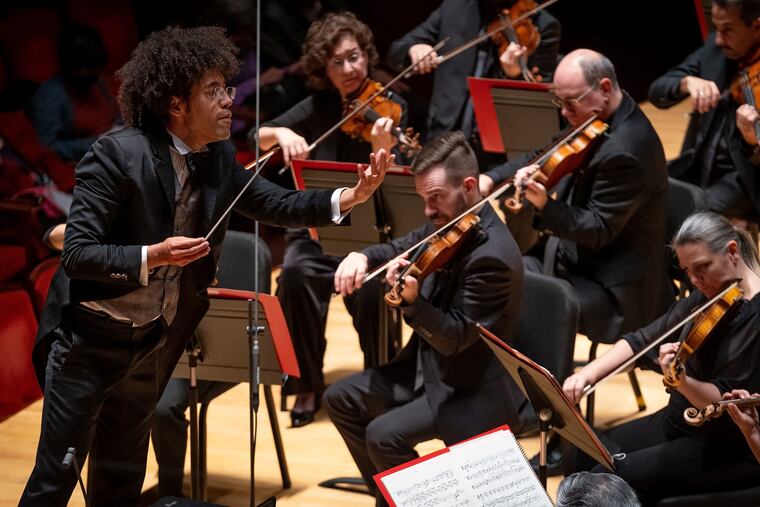Emerging conducting star Rafael Payare is electric in his Philadelphia Orchestra debut
Ricardo Morales was soloist in a new clarinet concerto by Jacob Bancks that was both frisky and tender.

Rafael Payare arrived for his Philadelphia Orchestra debut Thursday night with a strong suit in hand — Dvořák, a specialty of his.
It’s hard to think of an emerging artist these days from whom greater things are expected. At 41 — young for a conductor — Payare has already been a guest at top orchestras worldwide, and he seems to hit the jackpot wherever he goes. This season he is easing in as music director-designate of the Montreal Symphony Orchestra, which Charles Dutoit long ago built into a recording powerhouse.
That elder conductor was integral to the Philadelphia Orchestra’s sound print for decades, and if first impressions are correct, Payare and Dutoit couldn’t be more different. Slender, with long fingers used expressively, Payare in his Verizon Hall appearance proved a conductor with a bit of an edge. Dvořák’s Symphony No. 7 was on full boil from the start, and if there’s a single word to describe this product of Venezuela’s El Sistema music training program, it’s animated.
But what is the source of this joyride? Much of it is visual. Payare lifted off, literally, numerous times, sending pulses of adrenaline into the audience. Often, the balletics translated into sound, moving the orchestra in one dramatic direction or the other. Sometimes his gestures seemed inert.
There were no big revelations in the Dvořák, no reordering of ensemble balance in this passage to highlight an important idea or unusual reshaping of that phrase to uncover a meaning undetected by other conductors.
But Payare’s presence had a generally energizing effect on the ensemble. They played well for him. And that’s a promising sign.
A different overture might have given a more complete portrait of the artist, or even a less traditional format than the overture, concerto, symphony format of this program, which continues through the weekend. Berlioz’s Roman Carnival Overture was ablaze, but the work doesn’t cover a wide emotional spectrum. The English horn solo, played by Elizabeth Starr Masoudnia, was curiously unexpressive.
Payare, though, didn’t totally lean on the old standards. In the concerto slot was the world premiere of Jacob Bancks’ Clarinet Concerto, co-commissioned by the orchestra with the Quad City Symphony and the United States Marine Band Chamber Orchestra. It’s an amiable work — frisky, colorful, voluble, and written in a direct musical style that sometimes suggests the hand of a Francophile.
The three connected movements — labeled “Unruly,” “Tender,” and “Defiant” — follow the familiar concerto shape. It’s high-energy stuff, and that aspect of the piece gave soloist Ricardo Morales plenty of ways to highlight his superior technical firepower.
But it was the more lyrical sections that caught my ear, and Morales carried these moments beautifully. There was a lovely back-and-forth between the solo clarinetist and flutist Patrick Williams, a dreamy aspect to the second movement, and a third movement that suggested, in the best sense, a movie score. In a concerto, the soloist may be the hero, but this is a concerto that knows that when it comes to visiting magical places, it’s only the orchestra that can bring you along.
Additional performances: Friday and Saturday at 8 p.m. in Verizon Hall, Broad and Spruce Streets. Tickets are $10-$169. philorch.org, 215-893-1999.